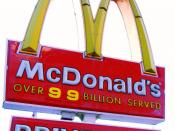McDonalds, the leading fast food industry nowadays, as well as a Trans National Cooperation. Due to the lower production cost and potential market, McDonalds has been expanding its production and selling line in China.
It is seen to bring a positive consequence to China.
Economically.
The existence of McDonalds in China's soil increases the employment rate (though the Central Government keeps claming that the unemployment rate is 0). According to the official report, there are nearly 50000 citizens employed in the "McDonalds' sector" in more than 680 branches in China . Besides, the tax income from the incoming industry directly spurs up the Government revenue, solely in year 2000, McDonalds had already paid over one hundred million RMB to the Central Government . These two benefits can directly increase the national GDP and the Government then can reinvest the capital into the public sectors such as education and medical care and therefore to push the economy to move further.
Nonetheless, to look behind the fancy benefits, there may have a heavier weight of defects to China's economy. From employment perspective, since most of the McDonalds staffs are teenagers and students, who successfully competed with the elder group, may lead to an unemployment of elderly, and since the old folks didn't have chance to receive high education, they lose the competitive ability. Plus the "no pension" system in China, elder people may probably be forced to commit poor jobs such as to collect cans in streets and sell them for living. Besides, due to the low wages and short working hours in McDonalds, (probably under 13 hours a week), people may not sufficient to feed their own families. And as they counted the "under-employed" inside the "employed" group, the huge number of employment rate could be just a meaningless...


